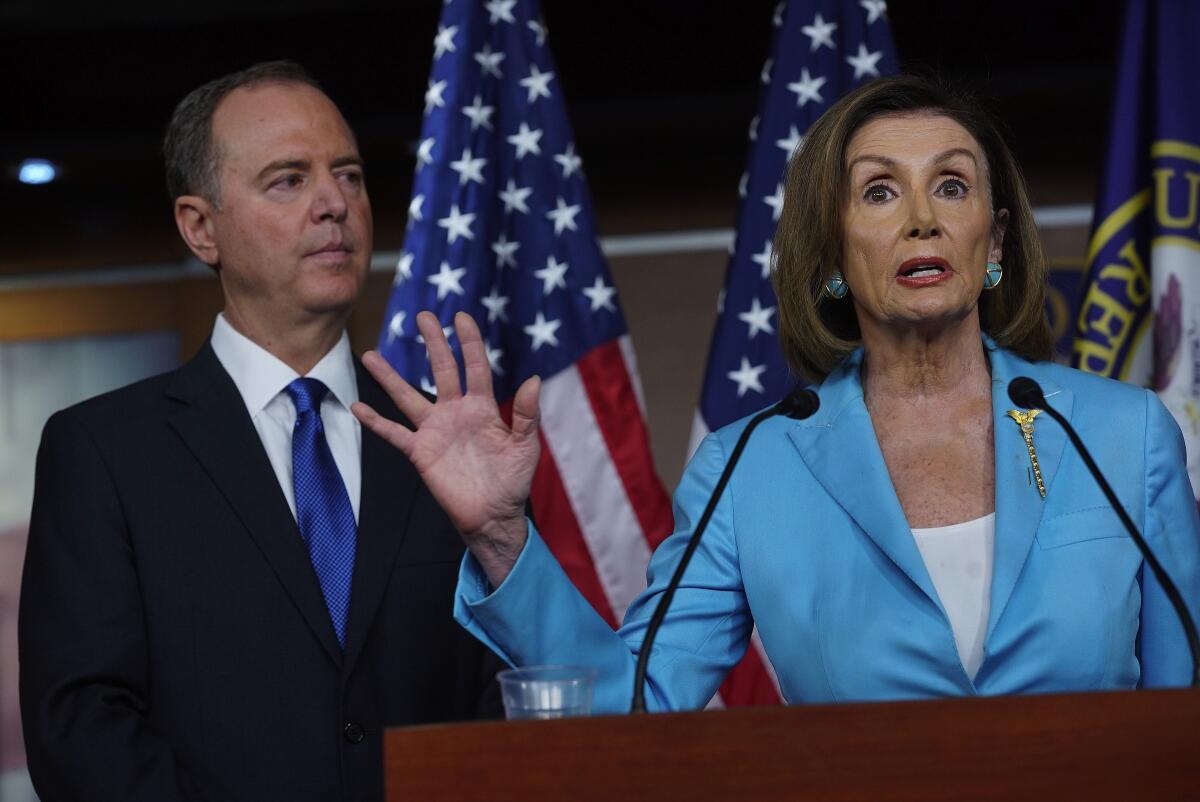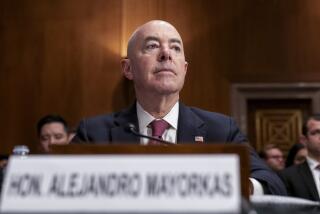Two things are now clear: Trump’s call wasn’t ‘perfect,’ and he won’t be removed

- Share via
Impeachment testimony before the House Intelligence Committee this week has seen both parties run into unmovable truths: For Republicans, it’s become clear that something happened here that falls short of “perfect,” the word President Trump has used to describe his phone call with Ukraine’s president; for Democrats, it’s become clear that the storyline they’ve laid out is unlikely to convince Republicans to remove Donald Trump from the presidency.
Attempts by Democrats to force public opinion into the binary choice of condoning a quid pro quo or impeaching the president was always going to be problematic, given the president’s strong support among rank-and-file Republicans and the GOP’s inherent distrust of Speaker Nancy Pelosi, Intelligence Committee Chairman Adam B. Schiff, and a radical resistance that has pushed for the president’s impeachment since he won in 2016.
Case in point: Even before Trump took office, an article in Vanity Fair described a December 2016 legislative effort by five Democratic senators, including Elizabeth Warren, as “paving the way to impeach Donald Trump.” You have to understand how Republicans see this: One month after Trump’s win, plans for a coup were already underway.
And lest you think use of the word “coup” is something hysterical Republicans have deployed to whip conservatives into a frenzy, they borrowed it from a card-carrying member of the liberal resistance: attorney Mark Zaid, better known as the whistleblower’s lawyer. In January 2017, Zaid tweeted: “#coup has started. First of many steps. #rebellion. #impeachment will follow ultimately. #lawyers.”
So the attorney for the whistleblower who started this impeachment frenzy (yet will not appear before the Intelligence Committee) predicted a “coup” and “impeachment” almost simultaneously with Trump taking office. You’d have to forgive your average Republican in flyover country for taking Trump’s opposition at its word.
That said, the witnesses brought by Democrats to make their case did not resemble the unhinged liberal resistance that has constantly clamored for Trump’s removal. The U.S. government professionals who testified seemed like honest American patriots who didn’t really want to be there. None of them deserved to have their reputations sullied or their national loyalties called into question by the president or anyone else. I am sure they have their own political preferences, but we saw people who mostly stuck to the facts as they knew them.
Which was good and bad for Democrats. Had their witnesses appeared partisan, this impeachment would have collapsed before Week 2 ever started. But their testimony has failed to establish one key point: None has described direct contact with President Trump in which he articulated that Ukraine must do X before the United States would do Y.
Even as Democrats have failed to move public opinion enough to create a national consensus that the president deserves to be removed, the witnesses left little doubt that something happened. Trump’s Ambassador to the European Union Gordon Sondland testified that it was his “perception” that a quid pro quo was required for the Ukrainians to, at a minimum, get an Oval Office meeting.
While he never heard it directly from the president, Sondland did claim to have been working at the direction of the president’s lawyer, Rudolph W. Giuliani. Sondland’s testimony was contradictory at times and gave both parties something to use to bolster their arguments, but his dropping in Giuliani as directly as he did was noteworthy.
And this has been true from the beginning: It was always likely that Democrats would be able to present witnesses that at least gave the strong impression that a quid pro quo scheme existed, a point argued for many weeks now by Andy McCarthy at National Review. Whether that scheme was inherently corrupt or constituted an impeachable offense, however, has remained in doubt. But because the president chose to insert Giuliani in this mix, an unelected, unappointed (and therefore unaccountable) political actor, the likelihood of this scheme appearing untoward was always high.
My views on the likely outcomes have not changed. Democrats will impeach on a party line vote and may ultimately include articles that go beyond the Ukraine matter, as they have nothing to lose. The Senate will hold a trial because the votes don’t exist to short-circuit one.
And Senate Republicans, while expressing varying degrees of uneasiness with what happened, will not remove the president from office. Some may give speeches excoriating various players and decrying bad judgment, but they will ultimately reject the binary choice placed before the American people by the Democrats. You can disapprove of something a president did without removing him from office. After all, if bad judgment was an impeachable offense, every administration would die a thousand deaths.
This week’s Gallup Poll, showing 90% of Republicans approving of Trump, will bolster Senate Republicans. And the latest Marquette Poll from Wisconsin showing a drop in support for impeachment since October further reminds them that Washington’s teapot tempest hasn’t flooded middle America.
In the end, Democrats are handing President Trump a process that, while painful, will allow him to ultimately claim exoneration and say, “I told you so!” If the numbers out of Wisconsin are to be believed, Democrats may come to regret their decision to proceed.
Scott Jennings is former advisor to President George W. Bush and Senate Majority Leader Mitch McConnell and a CNN contributor. He is a contributing writer to Opinion. Twitter: @ScottJenningsKY.
More to Read
A cure for the common opinion
Get thought-provoking perspectives with our weekly newsletter.
You may occasionally receive promotional content from the Los Angeles Times.









